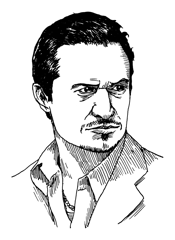
MIKE PATTON: The idea, at least in rock or pop culture, that the singer is on some pedestal in Speaker’s Corner—I’ve just never subscribed to that. I’m not a poet. I’m not up onstage to get something off my chest. I’m making musical statements, or, most of the time, musical questions for people to figure out, and I’m not going to get in the way of that.
THE BELIEVER: You’ve done some voice work for films and video games. How did you approach those?
MP: I did a lot of voice-overs for this movie I Am Legend a few years ago, and they said, “How do you want to do it?” And I just walked into the room—they had a giant freakin’ movie screen in front of me and a microphone—and they would play me the scene once, so I could understand, more or less, what was happening. And then they’d say, “OK, concentrate on this character. That guy with the green eyes. That zombie.” And so I’d do a pass. And they’d say, “Yeah. Pretty good. Try it again.” I’d do it again. Like three or four times, I’d get it. And it’s really a natural way to record.
BLVR: Which film scores have been important to you?
MP: In general, the more subtle a score is, the more effective it is for me. I think The Conversation would be a good example of that. It’s literally a freakin’ solo piano. And The Third Man, obviously, because it’s one instrument. I really like that approach. I’ve always wanted to do something—just choose an instrument, stick with it. It’s very hard to do these days. But if The Conversation were made now, you know it would be a full orchestra.
BLVR: Like everything else in film scores.
MP: But then, you know, that’s not to say—I mean, look, obviously the [Sergio] Leone movies were incredible, and they were really overblown and quite orchestrated, but I think the genius in those—and maybe this is really an important thing—is that it’s not really about how good the music is or how good the film is, it’s about how they work together. And Leone was one of the guys, one of the few guys, who would cut scenes to the music. That’s why that shit works so well. He’d get a cue from [longtime collaborator Ennio] Morricone and he’d cut the scene around it, sometimes shoot a scene around it. Which is completely the opposite of how it works normally, especially now, where the music, unfortunately, is one of the last things that they think about. The music is thought of as—it’s almost like when they’re doing the typeface for the credits. “Oh yeah, the music! Oh yeah, I guess we gotta have some music. Wow. Just throw some shit in there.” So it’s not thought of as an integrated part of the fabric of the movie. I’m working on this film now where I’m really feeling good about working with the director. It’s called The Place Beyond the Pines.
BLVR: Often in films it will already be so clear from the scene what emotion they’re trying to evoke, and then they try to evoke the same emotion in the music, creating this head-bashing sentimentality.
MP: It’s like, I don’t need to feel sad. I’m looking at sad, motherfucker!
An interview with Mike Patton (January 2013).




